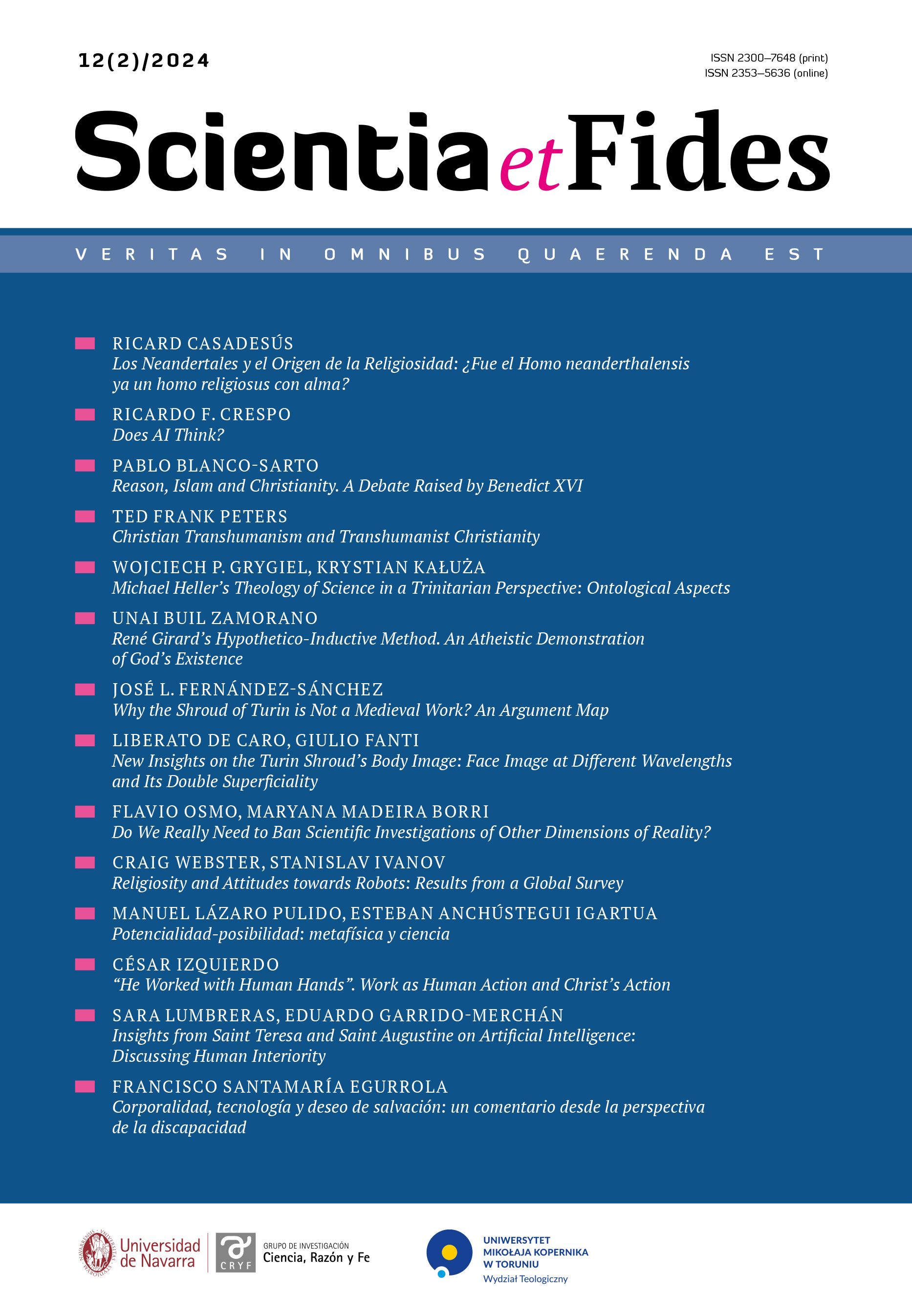“He Worked with Human Hands”. Work as Human Action and Christ’s Action
DOI:
https://doi.org/10.12775/SetF.2024.024Słowa kluczowe
labor, sense of life, action, mediation, pro-existenceAbstrakt
The complexity of work in our time presents new challenges for a theology that understands this fundamental dimension of existence and gives it an integrating, truly human meaning and a path to holiness. In order to embrace all modern forms of work, a definition of work is proposed as an action that involves the whole person and leads to fulfilment through work. Not only is work not a punishment, but the punishment would be not to be able to work. In work there is a convergence between nature and spirit. In order for the relationship between them to be harmoniously realised, a mediation is necessary that can only be exercised by man in which both meet. This avoids the risk of materialism and spiritualism in the understanding of work. But this mediation is limited to "this" concrete work. In order for there to be a mediation that includes all work, a Mediator is necessary, and that Mediator is Christ. The work that Jesus of Nazareth carried out was an exercise of his pro-existence and was therefore redemptive and salvific. It is in union with Christ that human work finds its ultimate meaning and transcendent efficacy.
Bibliografia
Benedict XVI. 2006. Homily. https://www.vatican.va/content/benedict-xvi/en/homilies/2006/documents/hf_ben-xvi_hom_20060413_messa-crismale.html
Blondel, Maurice. 1893. L’action. Essai d’une critique de la vie et d’une science de la pratique. Paris: Alcan.
Borne, Étienne, and François Henry. 1944. El trabajo y el hombre. Buenos Aires: Desclée de Brouwer.
Comisión Teológica Internacional (CTI). 1983. Documentos 1970–1979. Madrid: Cete.
Chenu, Marie-Dominique. 1955. Pour une théologie du travail, Paris: Editions du Seuil.
Chevrot, George. 1939. La vie de l’homme nouveau, Paris: Desclée de Brouwer.
Clavier, Henri. 1944. Le Christianisme et le travail. Clermont-Ferrand-Valence: Impr. Réunies.
De Rougemont, Denis. 1972. Penser avec les mains, Paris: Gallimard.
Delhaye, Philippe. 1957. “Théologie du travail.” L’Ami du Clergé 67: 432–5; 4 49–55.
Escrivá, Josemaría. 1985. Christ is passing by. New York: Scepter.
Granada, Daniel. 202. “Consideración unitaria del trabajo como acción en la historia de la teología del trabajo.” Scripta Theologica 56: 377–406.
Guitián, Gregorio and Ana Marta – González. 2022. “Theology of Work: New Perspectives.” Scripta Theologica 54: 757–87.
Izquierdo, César. 2017. “El Mediador, una clave para la teología.” Scripta Theologica 49: 351–70.
Izquierdo, César. 2017. El Mediador, Cristo Jesús. Madrid: Biblioteca de Autores Cristianos.
Izquierdo, César. 2021. “Cristo mediador en el II concilio de Constantinopla.” Scripta Theologica 53: 459–82.
Juan Pablo II. 1981. Enc. Laborem exercens. https://www.vatican.va/content/johnpaul-ii/es/encyclicals/documents/hf_jp-ii_enc_14091981_laborem-exercens.html.
Posadas, Jeremy. 2017. “The refusal of work in Christian ethics and theology. Interpreting work from an anti-work perspective.” Journal of religious studies 45: 330–61.
Ratzinger, Josef. 1971. Introducción al cristianismo. Salamanca: Sígueme.
Rondet, Henri. 1955. “Eléments pour una Théologie du travail.” Nouvelle Revue Théologique 77: 24–48.
Ruyer, Raymond. 1948. “Métaphysique du travail.” Revue de Métaphysique et de Morale 53: 190–215.
Todolí, José. 1952. “Teología del trabajo.” Revista Española de Teología 12: 559–79.
Volf, Miroslav. 2018. “Work as cooperation with God.” In Work. Theological foundations and practical implications, edited by en Loftin, R. Keith and Trey Dimsdale, 83–109. London: SCM Press.
Vveinhardt, Jolita, and Mykolas Deikus. 2023. “Strategies for a Nonviolent Response to Perpetrator Actions: What Can Christianity Offer to Targets of Workplace Mobbing?” Scientia et Fides 11(2): 175–95. DOI: https://doi.org/10.12775/SetF.2023.021.
Pobrania
Opublikowane
Jak cytować
Numer
Dział
Licencja
Prawa autorskie (c) 2024 Cesar Izquierdo

Utwór dostępny jest na licencji Creative Commons Uznanie autorstwa – Bez utworów zależnych 4.0 Międzynarodowe.
CC BY ND 4.0. Posiadaczem prawa autorskiego (Licencjodawcą) jest Autor, który na mocy umowy licencyjnej udziela nieodpłatnie prawa do eksploatacji dzieła na polach wskazanych w umowie.
- Licencjodawca udziela Licencjobiorcy licencji niewyłącznej na korzystanie z Utworu/przedmiotu prawa pokrewnego w następujących polach eksploatacji: a) utrwalanie Utworu/przedmiotu prawa pokrewnego; b) reprodukowanie (zwielokrotnienie) Utworu/przedmiotu prawa pokrewnego drukiem i techniką cyfrową (e-book, audiobook); c) wprowadzania do obrotu egzemplarzy zwielokrotnionego Utworu/przedmiotu prawa pokrewnego; d) wprowadzenie Utworu/przedmiotu prawa pokrewnego do pamięci komputera; e) rozpowszechnianie utworu w wersji elektronicznej w formule open access na licencji Creative Commons (CC BY-ND 3.0) poprzez platformę cyfrową Wydawnictwa Naukowego UMK oraz repozytorium UMK.
- Korzystanie przez Licencjobiorcę z utrwalonego Utworu ww. polach nie jest ograniczone czasowo ilościowo i terytorialnie.
- Licencjodawca udziela Licencjobiorcy licencji do Utworu/przedmiotu prawa pokrewnego nieodpłatnie na czas nieokreślony
PEŁEN TEKST UMOWY LICENCYJNEJ >>
Statystyki
Liczba wyświetleń i pobrań: 338
Liczba cytowań: 0



